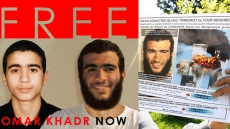TORONTO — The widow of an American soldier killed in Afghanistan will ask a Canadian court on Thursday for an urgent order aimed at preserving any money the federal government paid former Guantanamo Bay prisoner Omar Khadr for breaching his rights, new documents show.
The motion before Ontario Superior Court asks for a freeze on his money — the government reportedly paid Khadr $10.5 million last week — pending the outcome of a request to recognize a US$134.1-million Utah judgment against him.
The default American judgment was handed down in 2015 in Utah in favour of Sgt. Chris Speer's widow Tabitha and that of another former American soldier, Layne Morris.
"If the assets are not frozen pending the hearing of the application, there may be no assets left in Canada upon which the applicants may execute," their factum states. "The applicants have repeatedly requested assurances that the assets will not be dissipated. There has been no response."

The motion also calls on the court to order Khadr to "provide an accounting of the settlement funds, and the current location of all such funds, or property acquired thereby."
The Utah judgment is based on Khadr's admission before a discredited military commission in Guantanamo Bay in 2010 — subsequently recanted — that he threw a grenade that killed Speer after a fierce battle in Afghanistan in July 2002 in which Morris was blinded in one eye.
Khadr, now 30, did not defend the suit because he was in prison in Canada at the time.
"It appears that a conscious decision was made not to respond to the Utah action," the factum states. "The allegations contained in the complaint were deemed to be admitted when Khadr was noted in default in Utah."
Last Friday, the Canadian government apologized to Khadr as part of a settlement of his civil lawsuit for breaches of his rights during his imprisonment by the Americans in Guantanamo. The government did not confirm the reported $10.5-million payout.

In support of their motion, Speer and Morris lean heavily on Canadian news reports about the money, and about steps he took to ensure the payment was sheltered to prevent Speer's lawyers from getting at it.
"One may reasonably infer that Khadr may provide some of the settlement funds to his family members, who appear to be unrepentant supporters of violent extremists," the documents state.
As word broke early last week about the government's settlement with Khadr, Speer's Canadian lawyer wrote a Justice Department lawyer to press their points.
In response, the documents show, a government lawyer wrote that the settlement process was confidential and that he "could not answer whether the settlement was finalized and whether funds have been paid to Khadr."
Khadr's lawyer, Nate Whitling, did not immediately respond to a request for comment on Monday.
American forces captured a badly wounded 15-year-old Khadr following the battle in which Speer was killed. He spent 10 years in Guantanamo Bay before returning to prison in Canada. He was freed on bail while he appeals his military commission conviction in 2015.

KHADR SETTLEMENT FAR FROM UNPRECEDENTED; U.K., AUSTRALIA MADE SIMILAR DEALS
TORONTO — The Canadian government's breach-of-rights settlement with Omar Khadr is far from unprecedented, but its public apology to the former Guantanamo Bay prisoner sets Canada apart from other countries whose citizens were held at the infamous U.S. prison, an international human rights group said Monday.
The settlement — sources say Khadr was paid $10.5 million — echoes deals reached years ago by the governments of the United Kingdom and Australia, who also spent millions settling lawsuits.
However, Laura Pitter with Human Rights Watch said Canada had gone further than other countries by publicly acknowledging wrongdoing.

"It's really important that Canada took the additional step of publicly apologizing to him," Pitter said Monday from New York. "Canada's action here really sets an example."
Britain reportedly paid millions to several of its citizens detained at Guantanamo Bay but offered no apologies. One of the highest profile was Moazzam Begg, who along with seven others, had accused the U.K. and its intelligence agencies of complicity in their abduction, mistreatment and interrogation.
In November 2010, the U.K. government announced a settlement with Begg and 15 others, despite insisting British agents had not participated directly in any prisoner abuse. Officially, the settlement was made to avoid publication of sensitive documents related to Britain's co-operation with the U.S. on the transfer of terror suspects to various secret locations and to Guantanamo.
The British deal was reported to be worth 20 million pounds — about $30 million at the time. Then-justice secretary Kenneth Clarke noted it could have cost taxpayers more than double had it gone to court.
Announcing the Khadr deal on Friday, Justice Minister Jody Wilson-Raybould made a similar observation in light of the government having already spent $5 million defending the litigation.

"I hope Canadians take away two things today: First, our rights are not subject to the whims of the government of the day," Wilson-Raybould said. "Second, there are serious costs when the government violates the rights of its citizens."
In a similar case, suspected terrorist Mamdouh Habib reached a confidential settlement with the Australian government in 2010.
Arrested in Pakistan after the Sept. 11 terrorist attacks on the United States and taken to Egypt, where he was tortured for seven months, Habib was transferred to Guantanamo Bay in May 2002. The Americans released him without charge in January 2005.
Habib sued the Canberra government for alleged complicity with the CIA in his transfer and torture. Despite denying the allegations, the government settled. According to the Sydney Morning Herald, the "hushed-up" settlement followed evidence an Australian official had watched Habib's torture at Gitmo.
Pitter noted that the United States has never paid compensation to any of its former captives.
"The U.S., who is most responsible for the mistreatment of Khadr, has not done anything to provide him redress or redress to any of the scores of men who were unlawfully detained and tortured at Guantanamo and elsewhere since 9/11," Pitter said.
An inquiry in the U.K. found the British government and its intelligence services had indeed been involved in the illegal transfers of detainees, deliberately turned a blind eye to abuses, and had interviewed suspects they knew were being mistreated.

"Officers were advised that, faced with apparent breaches of Geneva Convention standards, there was no obligation to intervene," Sir Peter Gibson stated in his report.
In Khadr's case, a key tenet of his claim was that Canada's intelligence agencies had travelled to Guantanamo Bay to interview him in 2003, despite knowing he had been mistreated before their arrival to soften him up. The agents had also agreed to American demands to share information obtained from their interrogations with them.
The Supreme Court of Canada was unequivocal in 2010 in finding a breach of Khadr's charter rights, but the former Conservative government under Stephen Harper refused to demand his repatriation as other western countries had done for their citizens.
As with Canada's deal with Khadr, who pleaded guilty in 2010 to five purported war crimes before a widely criticized military commission, the British settlement ignited a political firestorm. Some argued the state was rewarding people who wanted to destroy it. Others maintained it was the right thing to do given the abuses uncovered.
"Our reputation as a country that believes in human rights, justice, fairness and the rule of law — indeed, much of what the services exist to protect — risks being tarnished," then-prime minister David Cameron told parliament in July 2010. "Public confidence is being eroded, with people doubting the ability of our services to protect us and questioning the rules under which they operate."



